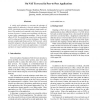Free Online Productivity Tools
i2Speak
i2Symbol
i2OCR
iTex2Img
iWeb2Print
iWeb2Shot
i2Type
iPdf2Split
iPdf2Merge
i2Bopomofo
i2Arabic
i2Style
i2Image
i2PDF
iLatex2Rtf
Sci2ools
125
click to vote
WETICE
2008
IEEE
2008
IEEE
On NAT Traversal in Peer-to-Peer Applications
A widely used technique to overcome the shortage of unique public IP addresses is Network Address Translation (NAT), which hides several hosts behind a single public address. This method works smoothly with client-server architectures; however, it causes severe problems with the peerto-peer (p2p) communication paradigm. Due to the side effects of NAT, the establishing connection is made possible only by using special NAT traversal techniques. This paper presents a lightweight framework for NAT traversal, which smoothly integrates with p2p applications. The framework can be easily used by most p2p applications, is extensible and does not require additional maintenance overhead.
Related Content
| Added | 01 Jun 2010 |
| Updated | 01 Jun 2010 |
| Type | Conference |
| Year | 2008 |
| Where | WETICE |
| Authors | Konstantin Pussep, M. Weinert, Aleksandra Kovacevic, Ralf Steinmetz |
Comments (0)

